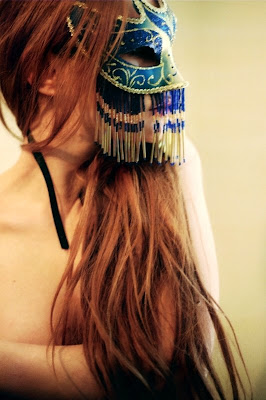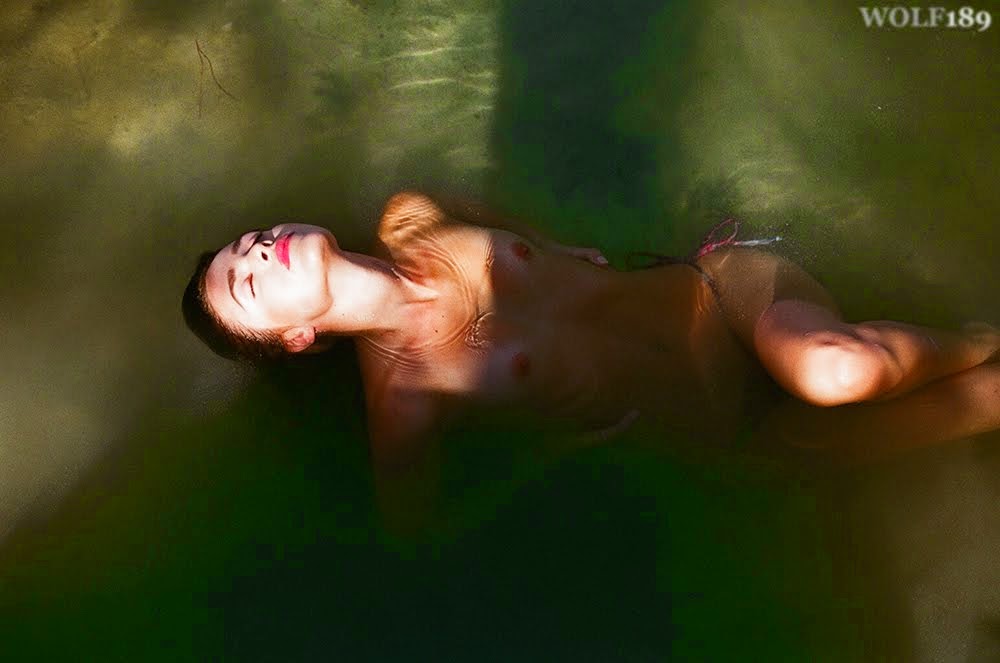



Style: Editorial Fashion + Conceptual + Sensual + Nude + Erotica Portraits
.
.
.
I enjoy Sergei Parajanov's visions and use of medium to express not only his emotions but also his dreams, nightmares and as he puts it, the "truth". The poetry of Sayat Nova ( or Colors of Pomegranates or Цвет граната ) surpasses any pre conceived ideas about what can be done in cinema...if you haven't watched it before, you must and of course more than once.
.
.
.
A little about Sergei Parajanov ( Сергей Иосифович Параджанов, Sergej Iosifovich Paradzhanov) :
.
"Sergei Parajanov (January 9, 1924 – July 20, 1990) was a Soviet Armenian film director and artist.
"Sergei Parajanov (January 9, 1924 – July 20, 1990) was a Soviet Armenian film director and artist.
.
Tarkovsky's first film Ivan's Childhood (1962) had an enormous impact on Parajanov's self-discovery as a filmmaker of genius (later the influence became mutual, they were also close friends). In 1964 he abandoned socialist realism and directed the poetic Shadows of Forgotten Ancestors, the first film in which he had complete creative control and which won numerous international awards. Unlike the subsequent The Color of Pomegranates, it was relatively well-received by the Soviet authorities.
Tarkovsky's first film Ivan's Childhood (1962) had an enormous impact on Parajanov's self-discovery as a filmmaker of genius (later the influence became mutual, they were also close friends). In 1964 he abandoned socialist realism and directed the poetic Shadows of Forgotten Ancestors, the first film in which he had complete creative control and which won numerous international awards. Unlike the subsequent The Color of Pomegranates, it was relatively well-received by the Soviet authorities.
.
Parajanov departed from Kiev shortly afterwards for homeland of Armenia. In 1968, he embarked on Sayat Nova, a film which many consider to be his crowning achievement, though it was shot under relatively poor conditions and had a very small budget. Soviet censors intervened once again and immediately banned Sayat Nova for its allegedly inflammatory content.
.
Parajanov departed from Kiev shortly afterwards for homeland of Armenia. In 1968, he embarked on Sayat Nova, a film which many consider to be his crowning achievement, though it was shot under relatively poor conditions and had a very small budget. Soviet censors intervened once again and immediately banned Sayat Nova for its allegedly inflammatory content.
.
Parajanov re-edited his footage and renamed the film, The Color of Pomegranates. It remains his best-known and most emblematic film. There have been few films where soul and high art blend together as in Color of Pomegranates. Few films have had such sublime magic. Parajanov gave the world a rare film which represents a cinematic insight into the artistic mind. It best justifies critic Alexei Korotyukov's remark: "Paradjanov made films not about how things are, but how they would have been had he been God."
.
By December 1973, Soviet authorities had grown suspicious of Parajanov's apparently subversive inclinations (particularly bisexuality) and sentenced him to five years in a hard labor camp in Siberia for "a rape of a Communist Party member, and the propagation of pornography." Three days before he was sentenced, Andrei Tarkovsky wrote a letter to the Central Committee of the Communist Party of the Ukraine:
.
”In the last ten years Sergei Paradjanov has made only two films: Shadows of Our Forgotten Ancestors and The Colour of Pomegranates. They have influenced cinema first in the Ukraine, second in this country as a whole, and third - in the world at large? Artistically, there are few people in the entire world who could replace Paradjanov. He is guilty - guilty of his solitude. We are guilty of not thinking of him daily and of failing to discover the significance of a master.”
By December 1973, Soviet authorities had grown suspicious of Parajanov's apparently subversive inclinations (particularly bisexuality) and sentenced him to five years in a hard labor camp in Siberia for "a rape of a Communist Party member, and the propagation of pornography." Three days before he was sentenced, Andrei Tarkovsky wrote a letter to the Central Committee of the Communist Party of the Ukraine:
.
”In the last ten years Sergei Paradjanov has made only two films: Shadows of Our Forgotten Ancestors and The Colour of Pomegranates. They have influenced cinema first in the Ukraine, second in this country as a whole, and third - in the world at large? Artistically, there are few people in the entire world who could replace Paradjanov. He is guilty - guilty of his solitude. We are guilty of not thinking of him daily and of failing to discover the significance of a master.”
.
An diverse group of artists, filmmakers and activists protested on behalf of Parajanov, but to no avail (among them, Yves Saint Laurent, Françoise Sagan, Jean-Luc Godard, François Truffaut, Luis Buñuel, Federico Fellini, Michelangelo Antonioni, Andrei Tarkovsky, and Mikhail Vartanov). Parajanov served four years out of his five year sentence, and later credited his early release to the efforts of the French Surrealist poet and novelist Louis Aragon, the Russian poet Elsa Triolet (Aragon's wife), and the American writer John Updike.
.
While incarcerated Parajanov produced a large number of miniature doll-like sculptures (some of which were lost) and some 800 drawings and collages, many of which were later displayed in Yerevan, where the Parajanov Museum is now permanently located. The museum opened in 1991, the year after Parajanov’s death, and hosts more than 200 works as well as furnishings from his home in Tbilisi. His efforts int he camp were repeatedly compromised by prison guards, who deprived him of materials and called him mad, their cruelty only subsiding after a statement from Moscow admitted "the Director is very talented."
While incarcerated Parajanov produced a large number of miniature doll-like sculptures (some of which were lost) and some 800 drawings and collages, many of which were later displayed in Yerevan, where the Parajanov Museum is now permanently located. The museum opened in 1991, the year after Parajanov’s death, and hosts more than 200 works as well as furnishings from his home in Tbilisi. His efforts int he camp were repeatedly compromised by prison guards, who deprived him of materials and called him mad, their cruelty only subsiding after a statement from Moscow admitted "the Director is very talented."
.
In February 1982 Parajanov was imprisoned one final time, on charges of bribery, which happened to coincide with his return to Moscow for the premiere of a play commemorating Vladimir Vysotsky at the Taganka Theatre, and were affected with some degree of trickery. Despite another heavy sentence, he was freed in less than a year with his health seriously weakened.
In February 1982 Parajanov was imprisoned one final time, on charges of bribery, which happened to coincide with his return to Moscow for the premiere of a play commemorating Vladimir Vysotsky at the Taganka Theatre, and were affected with some degree of trickery. Despite another heavy sentence, he was freed in less than a year with his health seriously weakened.
.
With the encouragement of various Georgian intellectuals, he created the multi-award winning Legend of Suram Fortress based on the novella by Daniel Chonkadze, his first return to cinema since Sayat Nova first premiered fifteen years earlier. In 1988 Parajanov made another multi-award winning film, Ashik Kerib, based on a story by Mikhail Lermontov. It tells of the life of a wandering minstrel and is set in the Azeri culture. Parajanov dedicated the later film to the memory of his close friend Andrei Tarkovsky and "to all the children from the world".
With the encouragement of various Georgian intellectuals, he created the multi-award winning Legend of Suram Fortress based on the novella by Daniel Chonkadze, his first return to cinema since Sayat Nova first premiered fifteen years earlier. In 1988 Parajanov made another multi-award winning film, Ashik Kerib, based on a story by Mikhail Lermontov. It tells of the life of a wandering minstrel and is set in the Azeri culture. Parajanov dedicated the later film to the memory of his close friend Andrei Tarkovsky and "to all the children from the world".
.
He died of cancer in Yerevan, Armenia, on July 20, 1990, aged 66, leaving his final film, The Confession unfinished. It survives in its original negative as Parajanov: The Last Spring, assembled by his close friend Mikhail Vartanov in 1992. He left behind a book of memoirs of the same name.
He died of cancer in Yerevan, Armenia, on July 20, 1990, aged 66, leaving his final film, The Confession unfinished. It survives in its original negative as Parajanov: The Last Spring, assembled by his close friend Mikhail Vartanov in 1992. He left behind a book of memoirs of the same name.
.
Such luminaries as Federico Fellini, Tonino Guerra, Francesco Rosi, Alberto Moravia, Giulietta Masina, Marcello Mastroianni and Bernardo Bertolucci were among those who publicly mourned his passing. In a telegram that came to Russia: "The world of cinema has lost a magician".
Such luminaries as Federico Fellini, Tonino Guerra, Francesco Rosi, Alberto Moravia, Giulietta Masina, Marcello Mastroianni and Bernardo Bertolucci were among those who publicly mourned his passing. In a telegram that came to Russia: "The world of cinema has lost a magician".
.
Quotes
.
"Direction is about truth. It's about God, love and tragedy"
Quotes
.
"Direction is about truth. It's about God, love and tragedy"
.
"Tarkovsky, who was younger than I by ten years, was my teacher and mentor. He was the first in Ivan's Childhood to use images of dreams and memories to present allegory and metaphor. Tarkovsky helped people decipher the poetic metaphor. By studying Tarkovsky and playing different variations on him, I became stronger myself... I did not know how to do anything and I would not have done anything if there had not been Ivan's Childhood."
.
"Only good can overwhelm the evil" "
.
Links / References :
"Tarkovsky, who was younger than I by ten years, was my teacher and mentor. He was the first in Ivan's Childhood to use images of dreams and memories to present allegory and metaphor. Tarkovsky helped people decipher the poetic metaphor. By studying Tarkovsky and playing different variations on him, I became stronger myself... I did not know how to do anything and I would not have done anything if there had not been Ivan's Childhood."
.
"Only good can overwhelm the evil" "
.
Links / References :
.
.
.
.
Cheers
.
Wolf189
LA, Las Vegas, Phoenix, NYC
волк189 фотография
портрет, чувственный, изобразительное искусство
волк189 фотография
портрет, чувственный, изобразительное искусство














No comments:
Post a Comment